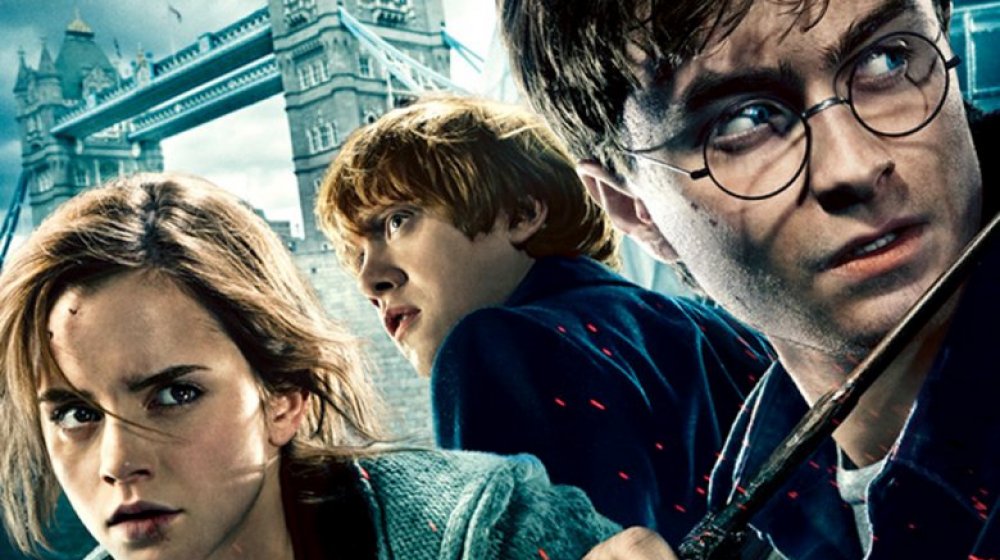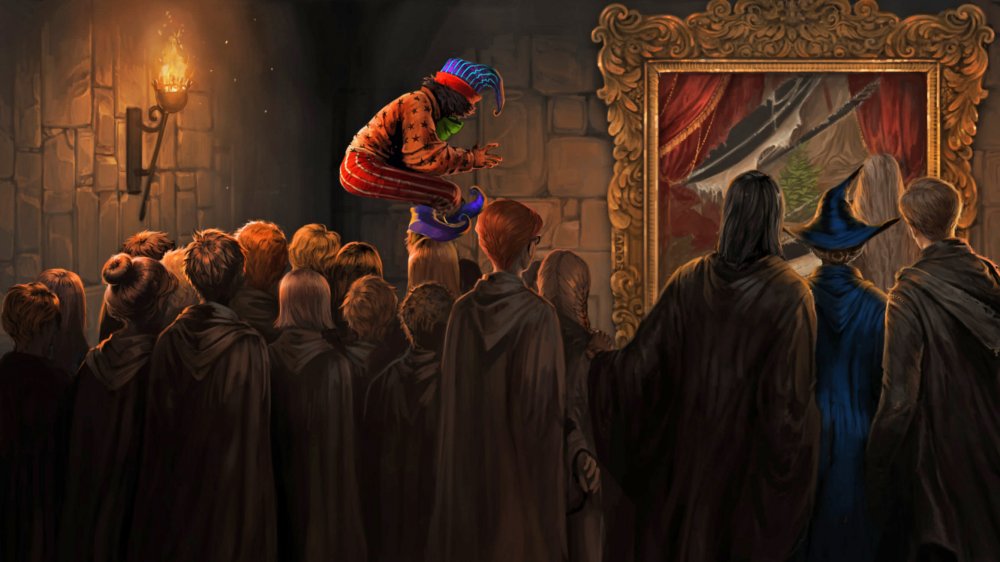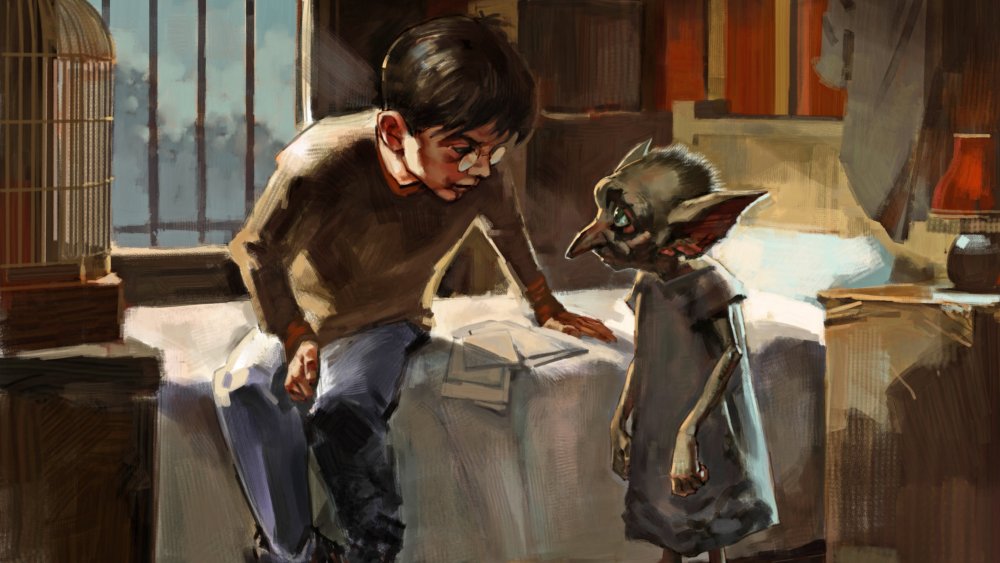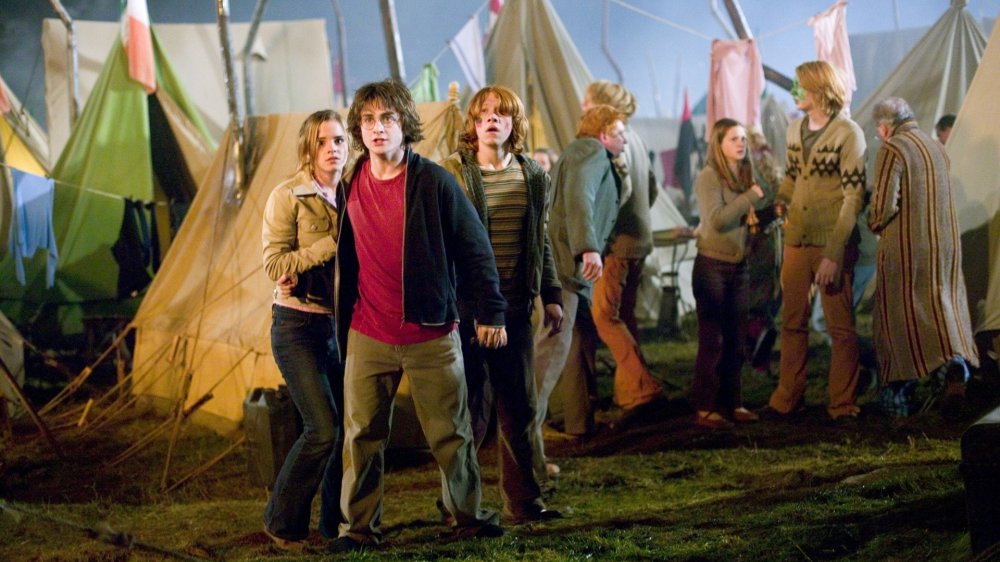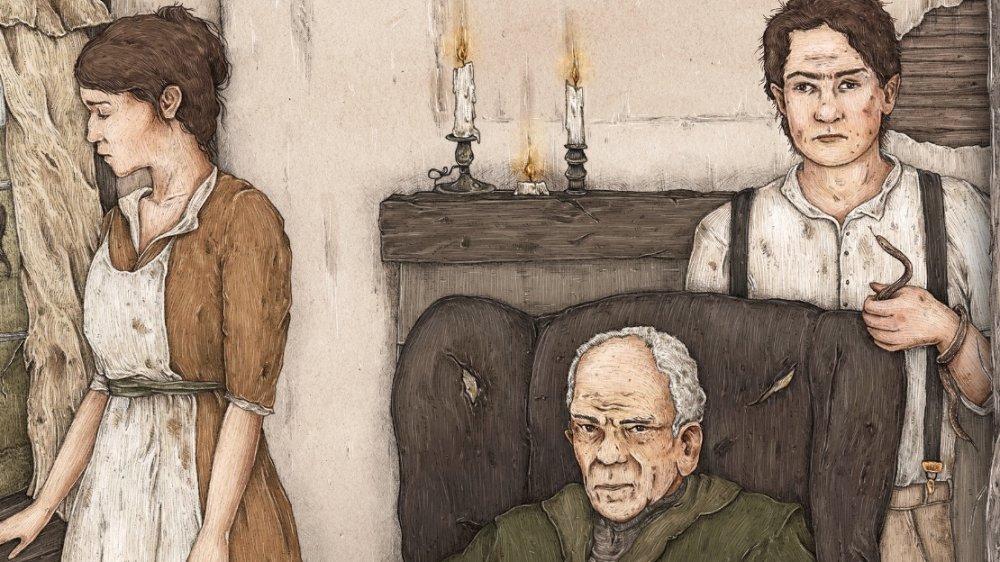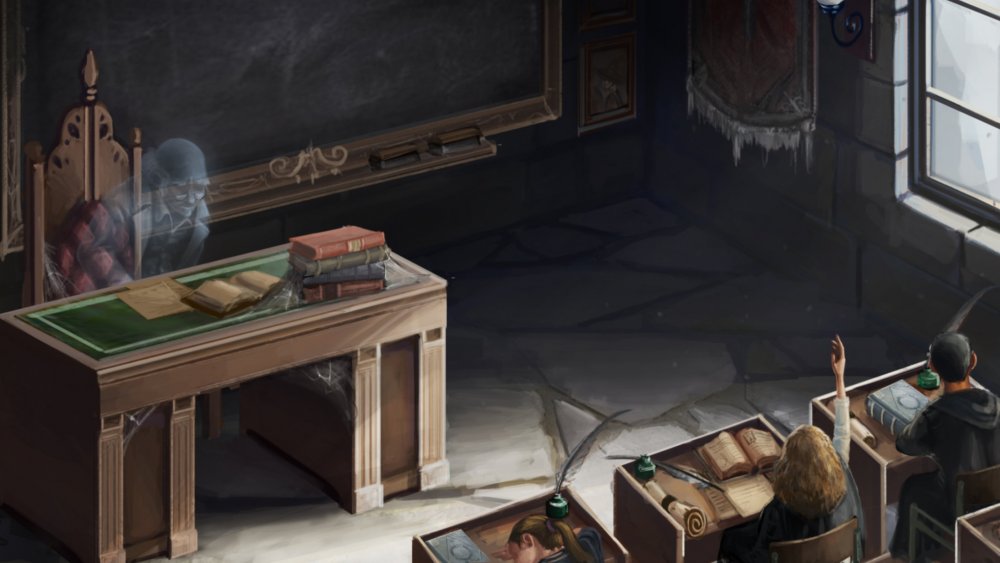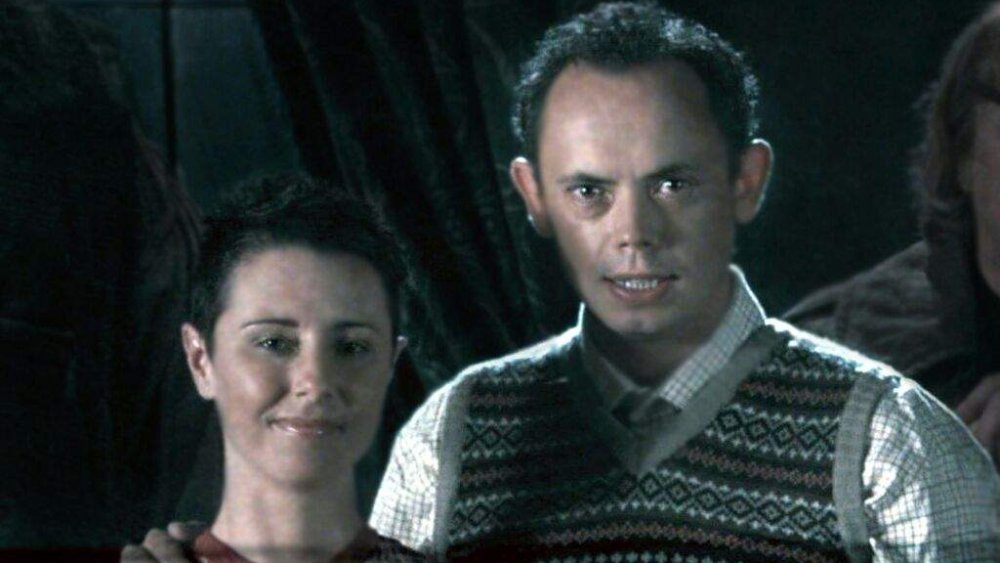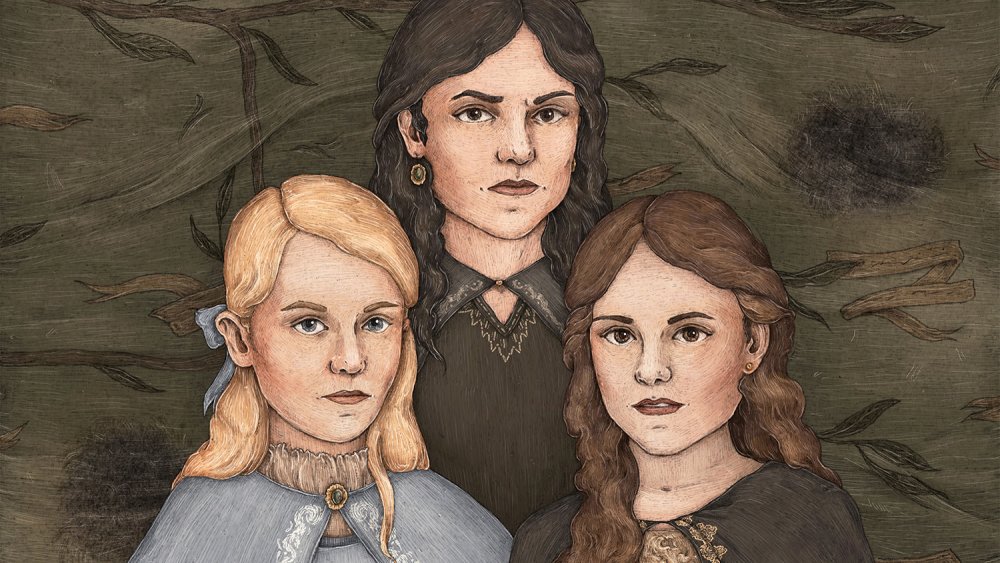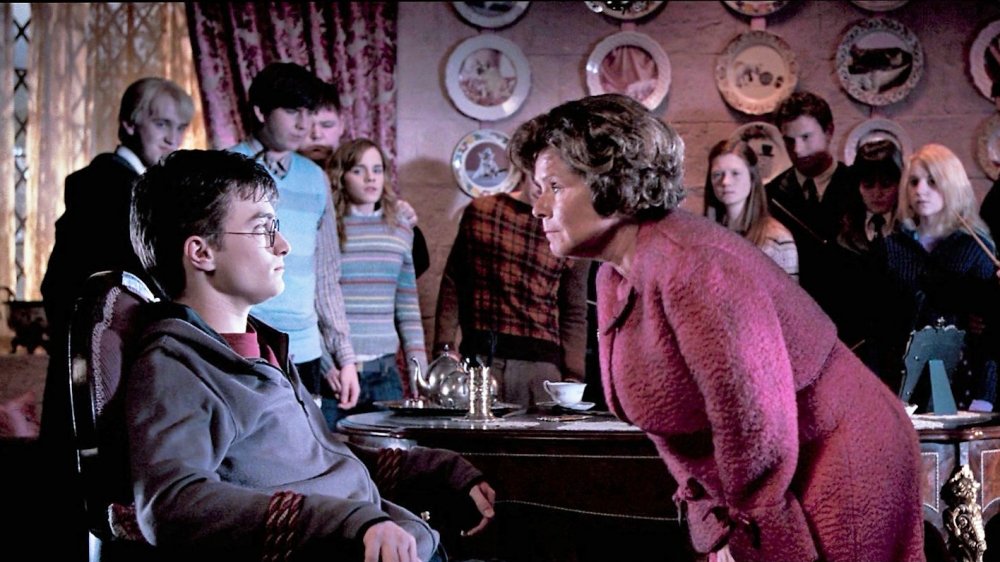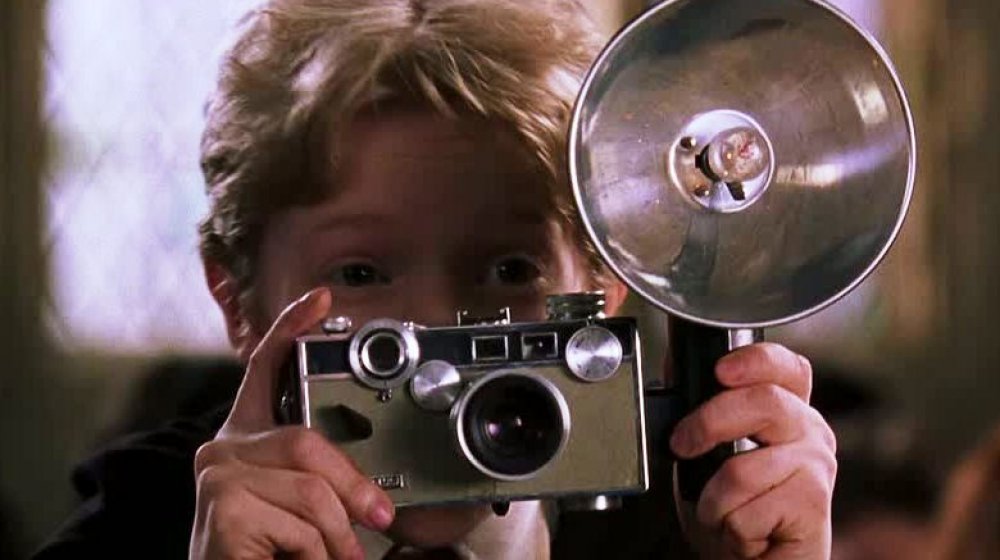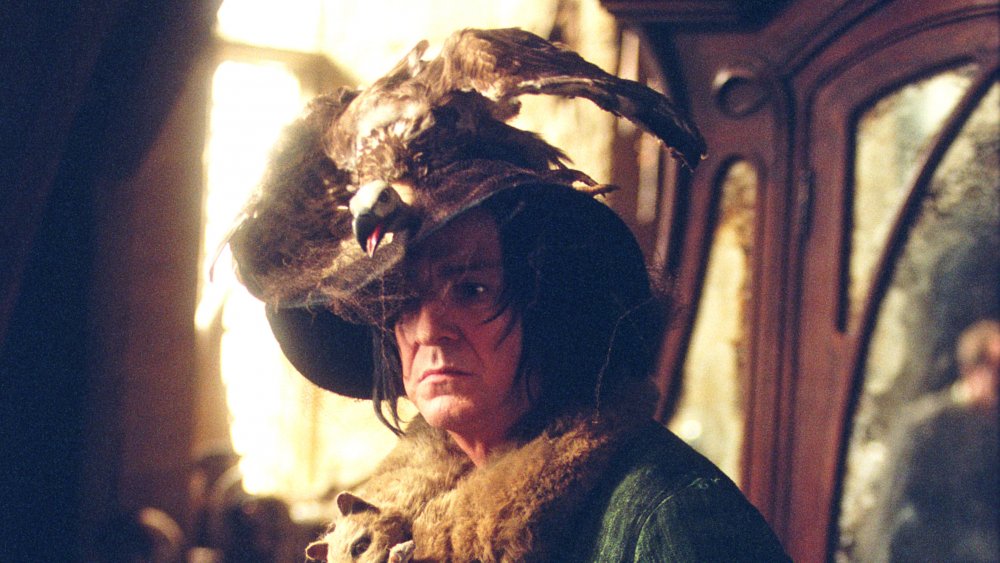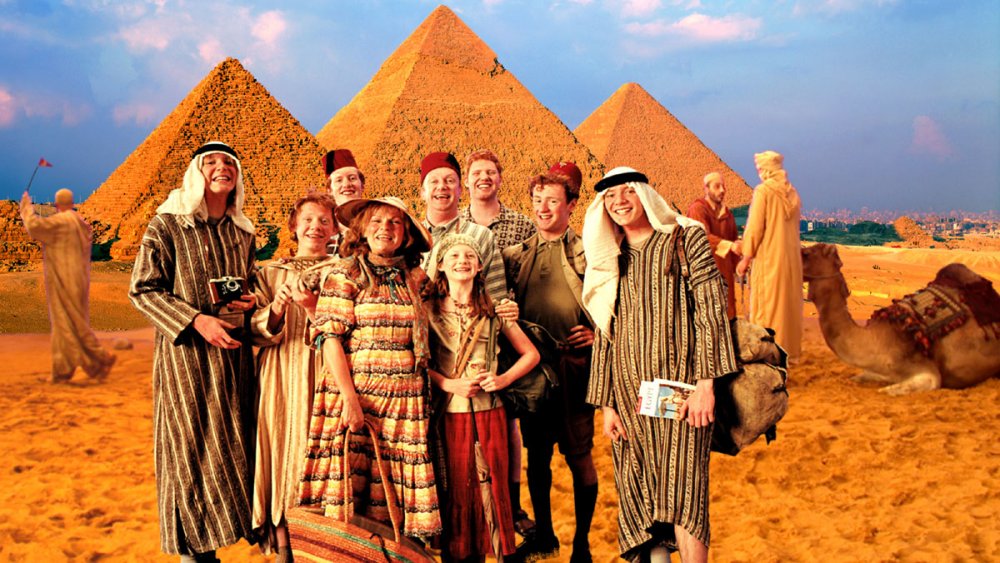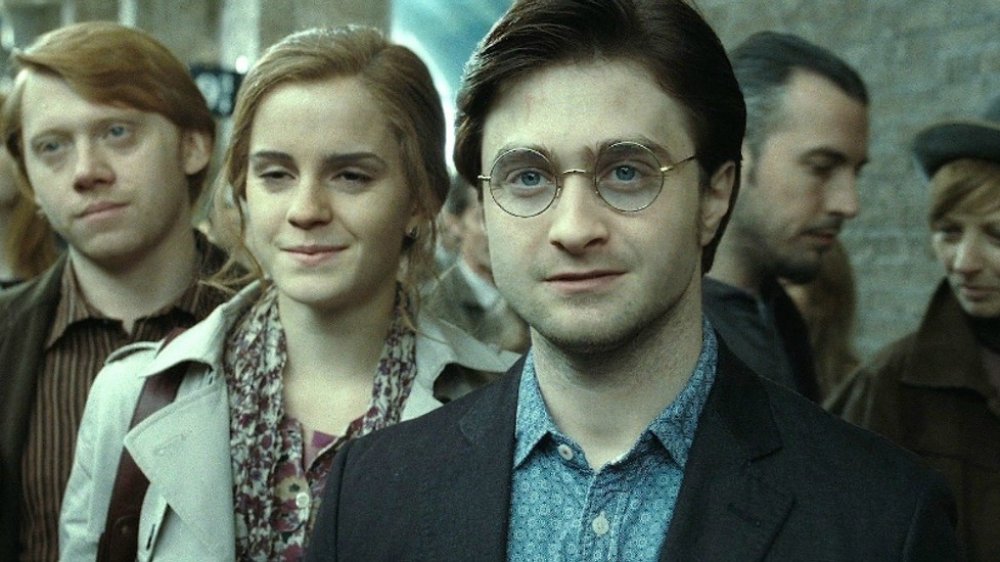Characters Who Were Left Out Of The Harry Potter Movies
Harry Potter and the Sorcerer's Stone arrived in theaters in 2001, and left the world forever changed. Suddenly, words like "muggle" and "Slytherin" were mainstream, kids everywhere became interested in British boarding school, and owls took on an entirely new significance in the cultural imagination. The Harry Potter movies, which comprise eight main films and two Fantastic Beasts installments so far, have become one of the most commercially successful franchises in cinematic history. Midnight premieres are attended, costumes are worn, and "Hedwig's Theme" is lodged forever in the minds of millions.
However, due to the sheer length of author J.K. Rowling's bestselling novels — the UK edition of the fifth book in the series, Harry Potter and the Order of the Phoenix, clocks in at a whopping, door-stopping 766 pages — much of what makes the Harry Potter series special never even made it into the movies at all. Directors Chris Columbus, Alfonso Cuarón, Mike Newell, and David Yates had to adapt an enormous amount of content into reasonably long films — cuts were inevitable... but still hard for fans of the books to stomach. Whether you're a diehard fan of the book series or have only seen the movies, we're here to catch you up on the characters left out of the Harry Potter film series. Some of them are pivotal, some of them are minor, but all of them deserve their own moment in the spotlight.
Peeves
As Harry Potter fans are well aware, Hogwarts School of Witchcraft and Wizardry is home to plenty of ghosts, including one for each school house: Nearly Headless Nick, the Grey Lady, the Fat Friar, and the Bloody Baron represent Gryffindor, Ravenclaw, Hufflepuff, and Slytherin, respectively. Moreover, most moviegoers are familiar with creepy, whiny Moaning Myrtle, who haunts a girls' bathroom. However, one spectral figure never made it into the movies: Peeves, Hogwarts' naughtiest creature of all.
Now, Peeves isn't technically a ghost, but a poltergeist. As such, he spends his days at Hogwarts causing complete and utter mayhem: He mocks students with goofy nicknames, splatters visitors with mud, and hides in suits of armor to scare unfortunate passerby. Crucially, however, Peeves ends up proving helpful against the forces of evil. Not only does he help drive Dolores Umbridge, one of the worst professors Hogwarts ever suffered, out of the castle entirely, he also ends up playing an important role in Deathly Hallows' climactic Battle of Hogwarts. Though Peeves was actually originally slated to appear in the Harry Potter film franchise — the late British comedian Rik Mayall even filmed a few scenes as the character — directors ultimately chose to leave him on the cutting room floor.
Winky
Fans of the Harry Potter films are familiar with Dobby, the high-spirited house elf who escapes servitude to become a trailblazing free elf. But there are plenty of other house elves in the book series who were unfortunately left out of the films. Chief among them is Winky, a house elf who spent her life serving the pure-blood Crouch family. The Crouches were a well-respected clan... until Barty Crouch Jr. joined Voldemort's nefarious army of Death Eaters, bringing shame to his family name. Ultimately, Barty Crouch Sr., a Ministry of Magic official known for taking a hard line against Death Eaters, pulled some secret strings to keep his devious son at home, under Winky's supervision. When the young Crouch outsmarts his loyal elf in Harry Potter and the Goblet of Fire, however, she is banished from her family home. Devastated, Winky goes on to find employment at Hogwarts alongside Dobby.
There have been plenty of debates about the way house elves and their liberation are handled throughout the Harry Potter books. Ultimately, leaving Winky on the cutting room floor downplays the complex experiences of these creatures — and leaves some pretty big plot holes in Barty Crouch Jr.'s story.
Ludo Bagman
One of the most glaring omissions from the Harry Potter and the Goblet of Fire movie is that of Ludo Bagman. As the Head of the Department of Magical Games and Sports, Bagman is responsible for organizing the Quidditch World Cup, which Harry and his friends attend before they return to Hogwarts, and the Triwizard Tournament, the multi-school event that dominates the subsequent school year. A former Quidditch star, Bagman is gregarious and popular... and, as it turns out, he's also hiding some very dark secrets.
After Harry is chosen as an unprecedented fourth Triwizard champion, he is forced to keep pace with students years beyond him in magical education and experience. As the tournament unfolds, Bagman is suspiciously helpful: He constantly offers guidance to Harry that he doesn't extend to the other champions, and even promises to deliver inside info that would help Harry cheat the system entirely. Harry refuses, correctly surmising that Bagman has ulterior motives. Ultimately, when the tournament ends in tragedy, Bagman flees — unbeknownst to his friends and coworkers, he's in deep gambling debt and had a lot of money riding on Harry winning outright. Leaving Bagman out of the fourth film might not have changed the narrative too drastically, but it did take some of the tension out of the overall story.
The Gaunts
During the sixth book, Harry Potter and the Half-Blood Prince, Harry and Dumbledore explore Voldemort's heritage, childhood, and adolescence, via the Pensieve. But in the film, pretty much every piece of Voldemort's family background and early odyssey ends up on the cutting room floor. This means that the tale of Voldemort's maternal ancestors, the Gaunts, has remained a mystery for anyone who hasn't read the books.
As Harry and Dumbledore explore a memory gathered from former Ministry worker Bob Ogden, they discover Voldemort's mother, Merope Gaunt. Merope grew up in an abusive household on the outskirts of a small town called Little Hangleton, ruled by her father Marvolo and older brother Morfin. Lonely, abused, and desperate, she tricked Tom Riddle, the handsome son of a powerful local family, into ingesting a love potion. The drugged Riddle whisked her away to be married, and their coupling resulted in the boy who would become Voldemort. The Gaunt family is descended from Salazar Slytherin himself, a fact of which Voldemort is immensely proud. Ultimately, it's at the Gaunts' abandoned house that Dumbledore finds the ring that houses the Resurrection Stone, one of the three immensely powerful Deathly Hallows. It's understandable that the films couldn't include all of Voldemort's backstory, but leaving the Gaunts out entirely seems like a pretty big omission.
Professor Binns
Hogwarts boasts a wide variety of ghosts, but if you're only familiar with the movies, you might not know that one of those ghosts is actually a full-fledged member of the faculty. In the books, Professor Cuthbert Binns serves as the school's History of Magic professor... despite the fact that he's dead. According to legend, he died one day in his office, and simply stood up in ghostly form and continued teaching. Throughout the series, Harry often notes how boring Binns' class is — Hermione is the only one who's able to stay awake during the spectral professor's oppressively dull lectures.
Though Professor Binns is easy enough to exclude from the films, he does serve a very important purpose in Harry Potter and the Chamber of Secrets. When students have questions about the unknown force terrorizing the school, Binns is the only adult willing to provide answers. For once, the ghostly teacher captivates his class with the lurid tale of Slytherin's legendary Chamber of Secrets — though he does take pains to keep his students from speculating too wildly. In the movie adaptation, Professor McGonagall explains the Chamber. This is a solid enough choice, but still: The fact that Hogwarts has a dead professor on its roster is a fun detail missing from the movies.
Frank and Alice Longbottom
As it turns out, Harry Potter isn't the only character in the series with a tragic family backstory — Neville Longbottom has one too. Throughout the series, Neville grows from an insecure young boy into a truly formidable wizard, in large part because he is driven to avenge the tragic mistreatment of his parents, Frank and Alice Longbottom.
As Harry discovers via the Pensieve in Goblet of Fire, a group of Death Eaters including Bellatrix Lestrange and Barty Crouch Jr. tortured Frank and Alice into insanity during Voldemort's first reign of terror. Though Harry doesn't tell anyone what he knows about Neville, he comes face to face with Neville's parents in Order of the Phoenix while visiting Mr. Weasley in the hospital. The pair reside there permanently, on a long-term ward where they can be fully cared for. Though Frank and Alice are briefly glimpsed in a picture in the Order of the Phoenix movie, their story is never fully told. In the end, the story is about Harry, not Neville, and the cut makes sense. But removing this part of Neville's backstory does take away some of his depth.
Andromeda and Ted Tonks
Moviegoers who caught the later Harry Potter films are familiar with Nymphadora Tonks, an Auror who can change her appearance at will. But if you've read the books, you know about her family life as well. Tonks is the daughter of Andromeda, a pure-blood witch of the ancient Black family, and Ted, a Muggle-born wizard. Andromeda's life is enormously complicated: Her sisters, Narcissa Malfoy and Bellatrix Lestrange, are both Death Eaters, while Andromeda, an ally of the Order of the Phoenix, was disowned for her beliefs and her choice of husband.
Andromeda and Ted only pop up a few times throughout the books, but they play crucial roles in helping Harry, even housing him briefly in Deathly Hallows after he leaves Privet Drive. Unfortunately, Ted dies in the fight against Voldemort, but he lends his support to Harry up until his end. His legacy is ensured when his daughter and her husband, Remus Lupin, name their son after him. When Tonks and Lupin are both killed in the Battle of Hogwarts, young Teddy is given to Andromeda to raise, with help from Harry, Teddy's godfather.
Marietta Edgecombe
In the fifth film, Harry Potter and the Order of the Phoenix, Harry and his friends form Dumbledore's Army, a secret group in which they learn defensive magic. For a while, everything goes as planned — but things go awry when Harry's crush, Cho Chang, reveals the group's existence under the influence of a truth potion. This brings Dumbledore's Army to a screeching halt, ruins Cho and Harry's relationship, and sets the book's climactic finale into motion.
Meanwhile, in the books, Cho doesn't snitch on Dumbledore's Army — that role falls to Cho's friend, Marietta Edgecombe, whose mother's job at the Ministry is threatened by her membership in the Army. Marietta reveals the group to Umbridge, and suffers an unforeseen consequence: Hermione made every member sign a list upon joining the group, which she secretly hexed. As soon as Marietta spills the secret of Dumbledore's Army, pustules erupt across her face, spelling out "SNEAK." Making Cho into the turncoat condenses the book's many characters and adds a dramatic punch, but book readers know the original story — and they'll never forget Marietta Edgecombe's betrayal and unfortunate fate.
Dennis Creevey
Throughout the books and the movies, Harry remains hesitant to accept his status as a wizarding celebrity. That becomes a lot more challenging in the second installment in the series, Harry Potter and the Chamber of Secrets, thanks to Colin Creevey. An over-eager first year student obsessed with Harry, Colin follows him everywhere in a desperate attempt to become his friend. Matters only get worse when his younger brother, Dennis, comes to Hogwarts during Harry's fourth year.
Though they might be annoying, Dennis and Colin are unfailingly loyal to Harry. Both brothers join Dumbledore's Army and fight in the Battle of Hogwarts at the end of the series. Tragically, Colin ends up giving his life for the cause, while Dennis' fate is unknown. In the movies, however, Dennis never appears at all. Perhaps the filmmakers felt Colin's appearance in Chamber of Secrets was all the exposure the Creevey brothers needed. Still, the lack of Dennis saps away some of the final battle's pathos.
Augusta Longbottom
Neville Longbottom endured a childhood without his parents, but at least he had one strong maternal figure in his life: His paternal grandmother, Augusta Longbottom. A formidable witch, Augusta is a stern presence in Neville's life. Though she frequently tries to push him beyond his limits, she truly cares for Neville. During an exercise in Neville's third year, Neville is faced with a boggart, a shape-shifting creature that takes the form of one's worst fear. Neville's greatest fear is Professor Snape, and so Professor Lupin tells him to find a way to render Snape hilarious instead of frightening. Neville accomplishes this by forcing the boggart-Snape into his grandmother's gaudy clothing. This is the closest Augusta comes to actually appearing in the movies.
Eventually, Augusta recognizes her grandson as a stalwart warrior, just like his parents. When Neville leads the rebellion from inside Hogwarts in Deathly Hallows, she sends her love and support, and even arrives at the Battle of Hogwarts to help him defeat the Death Eaters. Harry Potter is full of formidable mother figures, but Augusta Longbottom is one of the best.
Charlie Weasley
Considering how important the Weasley family is throughout the entire Harry Potter franchise, it's pretty surprisingly that one of the seven Weasley children was completely left out of the films. The second oldest of the redheaded brood, Charlie graduates from Hogwarts long before Harry and Ron even arrive there. When Ron and Harry first meet, Ron tells Harry that Charlie lives in Romania as a dragon tamer.
Charlie only shows up a few times during the novels, but he always plays a pivotal role. In the first book, Harry Potter and the Sorcerer's Stone, Charlie saves the day by rescuing Hagrid's would-be pet dragon Norbert before Hagrid gets in trouble. In Goblet of Fire, Charlie is one of the dragon tamers on hand during the Triwizard Tournament's first task, which pits Harry and the other champions against vicious mother dragons guarding their eggs. The Weasley family provides a home for Harry throughout the books and the movies, so it stands to reason that all of its members should be included in the films. Alas, Charlie never appears. Perhaps he decided to sit out the war in Romania?
Teddy Lupin
Teddy Lupin only appears in the epilogue at the end of Deathly Hallows, which is set 19 years after the epic Battle of Hogwarts. That doesn't mean he's not important, however. As Harry and Ginny send their second-oldest child, Albus Severus, off to Hogwarts to join their oldest son, James, his family mentions Teddy, who at that point had already graduated from Hogwarts. Teddy is Harry's godson, and, as Harry makes clear, a frequent guest at their dinner table. He is also, as the children excitedly announce, romantically involved with Victoire Weasley, Bill Weasley and Fleur Delacour's daughter.
The only child of Nymphadora Tonks and Remus Lupin, Teddy is raised by Andromeda Tonks, his maternal grandmother, with frequent help from Harry. After growing up an orphan in a miserable household, Harry is committed to raising Teddy with all the care and love he so desperately craved as a child. While Harry was lonely, isolated, and neglected, Teddy has the love of an entire community to support him. The epilogue may have been short by necessity, but including Teddy would have brought the story full circle.
